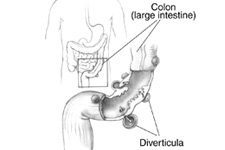Symptoms of Diverticulitis

Symptoms of diverticulitis can range from mild to severe constipation, diarrhea, abdominal pain, obstruction in the colon, rectal bleeding, and fever.
Symptoms of diverticulitis are often mistaken for the less serious digestive tract issues, and ninety percent of people who died from the disease never knew they had diverticulitis.[1]
What Is Diverticulitis And Diverticulosis?
Diverticulitis starts off as the less life-threatening diverticulosis. Diverticulosis occurs more commonly in the colon rather than the small intestine.
They develop when of the intestines’ constantly overexert themselves to move through food lacking fiber and water. The overexertion causes ruptures in the intestinal wall that form into into pockets called diverticula.
People can have diverticulosis and never know because it often presents without any symptoms, though it can also present with abdominal pain, and constipation or diarrhea.
Diverticulosis is upgraded to diverticuliti when the divertcula become inflamed with collected waste that becomes putrid and toxic, and ruptures. This causes toxic bleeding back into the intestines and cause infection in the abdomen and bladder.
What Causes Diverticulitis?
Diverticulosis and diverticulitis are common among people in the United States and among people who eat a Western diet, and less common in rural Africa and Asia.
The typical consumption of high fiber diets in rural Africa result in the formation of soft and long stools that are easy to move through the intestines.
Western diets are low in fiber and contribute to the formation of stools that are short and hard and are difficult to move along.
The intestines have to strain to move small hard fiber-lacking stool which leading herniation of the intestinal wall.
Diverticulitis Diagnosis
Western medicine has become more aware of the prevalence of diverticulitis and doctors might look at a collection of digestive tract issues as being diverticulosis or diverticulitis.
People who eat a low fiber diet and frequently have issues with a combination of constipation, diarrhea, abdominal pain, rectal bleeding, and fever should ask their doctor to perform a CT scan.
Other diagnostic tests include: ultrasound testing, a sigmoidoscopy, and colonoscopy.
Diverticulitis Treatment
Western Medicine
- The consumption of liquid and low fiber foods are advised during acute attacks of diverticulitis.[2] This is done to reduce the amount of material that passes through the colon, but this method is questionable because the reduction of fiber will cause the intestinal muscles to strain which will only intensify the problem.
- Medicine to relieve constipation or diarrhea
- Prescription antibiotics to combat infections
- Pain medications
- Surgery to remove the effected section of the intestine
Traditional Medicine
Traditional medicine approach addresses the cause of the disease.
- Remove the consumption of meat, dairy, and processed foods
- Drink the recommended one gallon of spring water a day
- Consume an alkaline plant based diet.(Drink lots of blended vegetable juices and fruit smoothies to make the digestive process easy on the intestines. The juices will gently stimulate the peristaltic action (wavelike motion) of the intestines to push waste out diverticula so the body can remove it. The juices will supply minerals and fiber the intestines can use to repair themselves. )
- Removal of the waste from the diverticula.
- Herbal Treatment: Herbs like cascara sagrada help to retone the intestinal tract by increasing its peristaltic action (wavelike motion). Fiber consumption normally triggers peristaltic action, which keeps the intestinal tract healthy and strong. Diets low in fiber cause the intestinal tract to strain and compromises its structure. I cover in detail how to use various herbs to restore the health of the intestine in my herbal book, Alkaline Herbal Medicine.
- This method is not part of Dr. Sebi’s methodology but I did have success with it. I only recommend this method for use as a jump-starter for a lifestyle change to an alkaline diet and longer term herbal treatment. This method is a short-term (three days only) colonic consisting of two major agents, bentonite clay which grabs onto the waste and pulls it out of the diverticula, an psyllium husk a natural dietary fiber uused to move the waste through the intestines for excression. I only recommend this method for short-term use because it attaches to everything in the colon, good and bad, bad mostly, and pulls out a lot of waste quickly. Using the method too long can irritate the intestinal tract. Herbal treatment is used along with this method and continued afterward.
- This method is not part of Dr. Sebi’s methodology, because of his concern about unbalancing the flora/bacteria in the colon. Using an enema during the process is helpful in moving the waste of of the body. A clove and black walnut enema is helpful in killing parasites living in the colon. Dr. Sebi did recommend against the use of enemas because they can unbalance the flora in the colon. As with the short-term bentonite clay cleanse I only recommend the use of enemas with the short-term cleanse. If you are having issues with diverticulitis it is more than likely the bad bacteria have taken over the colon, and the use of an enema just during this process will help greatly in removing a lot of bad bacteria quickly. Eating an alkaline plant based diet will quickly rebalance the flora in the colon.
These combined methods clean waste from the diverticula and increase the formation of long soft stools so the intestines don’t have to strain to process its contents. These methods allow the intestines to heal and return to or close to a state of homeostasis.
Learn About Foods That Support Health and Vitality on the Dr. Sebi Nutritional Guide »
[1] J Chapman, M Davies, B Wolff, E Dozois, D Tessier, J Harrington, D Larson. Complicated diverticulitis: is it time to rethink the rules? Ann Surg. 2005 Oct;242(4):576-81; discussion 581-3.
[2] medicinenet.com
Tags: bentonite clay uses, diverticulitis, diverticulosis






